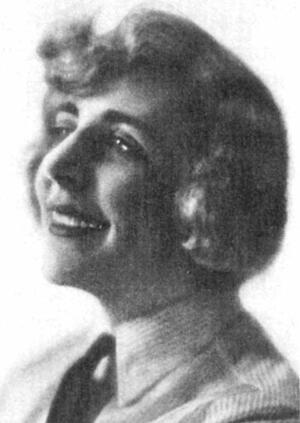"Grand Hotel" Novelist Hedwig (Vicki) Baum is Born
Hedwig Baum’s father was adamant: reading was a “secret vice,” and the young girl was forbidden to read for pleasure.
She would go on to write over 50 novels, including the novel that was adapted for the stage and screen as Grand Hotel. That star-studded movie featuring Greta Garbo and Joan Crawford would win the Oscar for Best Film in 1933, earning over a million dollars.
At 16, after winning a literary competition, she left school to enroll at the Vienna Academy, where she studied the harp. At 18 she married Max Prels, a journalist who introduced her to the world of letters and the Viennese cultural scene. Her first short stories were published under his name. When their brief marriage dissolved, she became the Archduke of Darmstadt’s Court and Chamber Musician. There she met her second husband, conductor Richard Lert. Of her relationships, she once commented, “Marriage always demands the greatest understanding of the art of insincerity possible between two human beings.”
After the birth of their first son, Baum sold her harp and turned to writing as a career. Her first novel was published in 1920 by Ullstein Verlag, for which she also worked as an editor. Encouraged by her employer to write a novel of “a capable young woman,” she wrote Stud. chem. Helene Willfüer (1928), which within three years sold over one hundred thousand copies. Dealing with the currently topical issue of the “New Woman,” the book describes the penetration of a highly educated woman into male-dominated academia and presented the new self-awareness and lifestyle of the “modern” women in the Weimar Republic. She then began a series of “hotel novels,” a genre she developed with a wide cast of characters who interact in the same locale over a defined period of time. Baum worked as a parlor maid in a Berlin hotel for six weeks to research the details and workings of hotel life. The book was rapidly serialized in a magazine, performed onstage in Berlin with a script by Baum herself, and was adapted for Broadway as Grand Hotel in 1931, becoming Broadway’s biggest hit in thirty years.
Baum’s visits to New York and Los Angeles encouraged her to decide to immigrate to the US with her family in 1932. While her husband was appointed conductor of the Pasadena Symphony Orchestra, she worked at Paramount and MGM for the next ten years. As she said at the time, “What I like about Hollywood is that one can get along by knowing two words of English—SWELL and LOUSY.” In her numerous novels written during this time (Over 30 in all), she often returned to writing about the developments in National-Socialist Germany, where her books were banned after 1935. Writing that “To be a Jew is destiny,” she became one of the world’s best-selling authors, though she referred to herself as a “first-class second-rate writer.”
Baum frequently depicted powerful, self-reliant women caught up in the social and economic turbulence of twentieth-century Europe and America. Among her later works were Hotel Berlin ‘43, set in Nazi Germany (1944) and Theme for Ballet (1958), which dealt with the American career of a beautiful Viennese dancer.
Vicki Baum died of leukemia in Hollywood on August 29, 1960. Her memoir, It Was All Quite Different, appeared posthumously in 1964.
See also: “January 24: Vicki Baum,” Jewish Currents.



